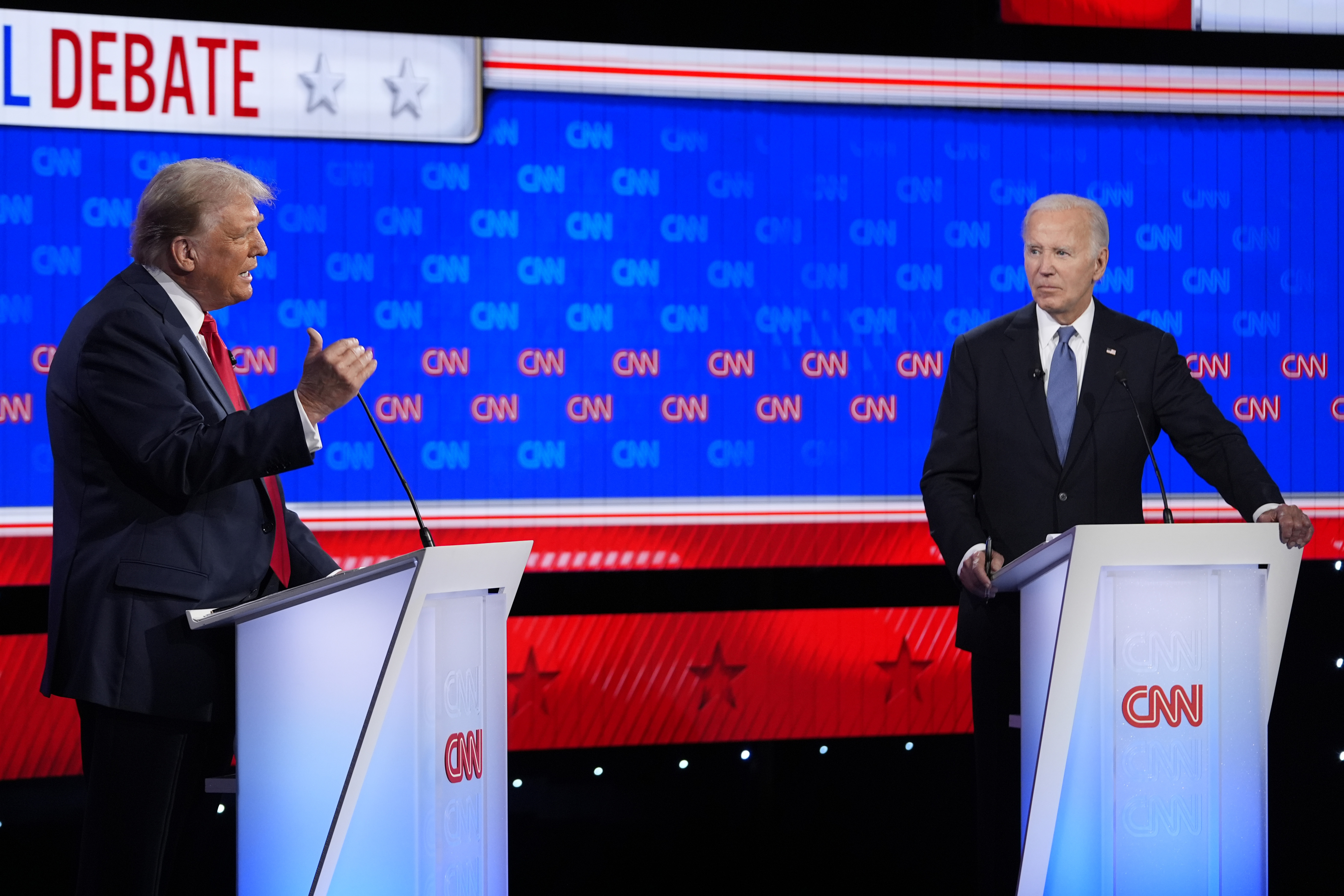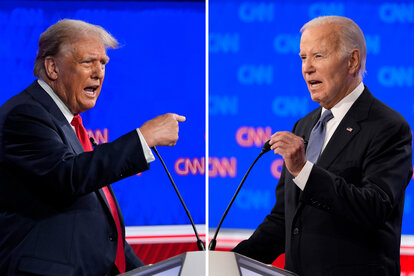US elections 2024
The Trump – Biden Rematch: What the Presidential Debate means for the Race to the White House

The first TV duel on CNN in June 2024 between President Joe Biden and presidential candidate Donald Trump.
© picture alliance / ASSOCIATED PRESS | Gerald HerbertIn the first of the scheduled debates between the Democratic and Republican frontrunners, immigration, the economy, and foreign policy were the core issues. Mr. Biden’s age was on clear display; so was Mr. Trump’s pugnaciousness, if more restrained than usual. The question on everyone’s mind: was this a wise choice for the sitting president?
The Format: Unexpected Trump Card?
In acceding to have the Democratic candidate debate his challenger, Mr. Biden’s team requested strict ground rules: no live audience, limited speaking time, and muted microphones during the other candidate’s turn. The expectation? A more orderly debate would shine a spotlight on the incumbent’s measured, policy-centric approach.
Contrary to some pundits’ predictions, however, it seems that Mr. Trump may also have benefitted substantially from the debate format. Although he couldn’t draw the laughs he is accustomed to from his previous interactions with debate audiences, the format forced a moderation of his affect, which may ultimately play to his benefit. Especially among voters usually disinclined to vote for Mr. Trump because of his blustery persona, but dissatisfied enough with the current administration that they might come into play this election — think suburban women, country club Republicans, or disaffected independents — the move to hold the debate in a controlled environment with strict time limits went a long way in neutralizing one of Mr. Trump’s major political vulnerabilities.
Where his brashness might otherwise have overshadowed his potential appeal to those groups on policy matters, here Mr. Trump’s pathos-laden message about national decline was framed in a mediatic format so comparatively sober (nota bene: our comparison should be Trump-Biden 2020, not Nixon-Kennedy or Reagan-Carter), it may have been able to win over even some of those listeners who generally lament the disappearance of a more civilized age of American discourse.
The Stumbles: A Serious Vulnerability
On substance, it was clear Mr. Biden had spent considerable time debate-prepping with his team. He touted economic figures, showed off legislative achievements, and made some concrete policy suggestions (though, for obvious reasons, nothing quite as granular as what we saw in the primary debates). At times, however, it almost seemed as if this fact were to Mr. Biden’s detriment. Not just because it makes for less rhetorical zest than the gut-level, intuitive appeal of Mr. Trump’s favorite themes, but because it obscures what is perhaps 81-year-old Mr. Biden’s best quality – sincerity.
Given Joe Biden’s age, memory, and speech patterns, attempts to rattle off prepared talking points made him appear at points confused or forgetful, particularly when he stumbled over his words. By contrast, some of Mr. Biden’s better moments in the debate occurred when he seemingly spoke off the cuff, a mode which plays up his grandfatherly warmth and avoids exposing his difficulty with lengthy, complex policy statements.
Those moments will likely not prove sufficient, in the minds of the millions of voters who watched in full and will be bombarded with clips of the debate over the coming weeks, to offset an overall less-than-ideal performance from the incumbent. Mr. Biden’s team was likely banking on a windfall in the shape of an unexpectedly energetic performance, perhaps akin his State of the Union Address. With expectations already so low among voters due to constant criticisms of his age and mental acuity, even a moderately dynamic performance could have been enough to prove his competence and moxie.
Mr. Biden’s performance was perhaps not catastrophic, but it was certainly marked by serious gaffes. As early as the third question, he stumbled from a plan to wipe out the national debt by fixing the tax system and raising, by his calculation, $500 billion from the nation’s wealthiest over a 10-year period (the national debt is currently at $35 trillion) to a bizarre statement that he had finally beaten Medicare — to which Mr. Trump responded that, indeed, he had beaten it to death (Mr. Trump proceeded to pivot towards migration and the overburdening of social services). Although Mr. Biden improved slightly in the second half of the debate, overall he did not exceed — and thus validated — initial low expectations. With this simple fact, Mr. Biden failed the one task his campaign needed him to ace.

Photo combination of Donald Trump (left) and Joe Biden (right).
© picture alliance / ASSOCIATED PRESS | Gerald HerbertThe Issues: Immigration, Economy, Foreign Policy
Initial reactions to the debate have praised the incumbent’s efforts to draw attention to his policy record, as well as what he perceives as the failings of his predecessor on the core issues American voters are concerned about. But here, again, Biden was hampered by his lack of brio, while Trump used every opportunity at his disposal — whether or not relevant to whichever question happened to have been asked — to hammer Biden on immigration, the economy, and foreign policy. (On all these issues, polling tells us the incumbent’s approval ratings are dangerously low.)
Mr. Trump constantly and strategically redirected to immigration, perhaps his biggest favorability advantage over President Biden. Biden is particularly vulnerable on this issue; when explaining what his administration was doing to address the border crisis, his answer ambled around, i.a., the construction of new asylum processing centers. This is not what most American voters think about when it comes to immigration; they care about jobs, overburdened social services, and displaced populations in their cities. When Biden brough up a terrorist border crossing under his predecessor’s administration, Trump immediately pivoted to the murder of three young girls by illegal immigrants. When Biden claimed lack of legislative support, Trump countered that he was able to take action through executive authority and Biden could have done the same.
The economy, as in every presidential debate, figured prominently. Questions by the moderators raised concerns about rising inflation, the future solvency of social security, and the national debt. On this front, neither candidate expressed any truly surprising position; the Republican frontrunner favors extending tax cuts, while the Democrat frontrunner wants higher taxation on top earners and corporations. Neither candidate came close to formulating real, actionable proposals that could come close to addressing the severe debt problem and other issues. At the popular level, however, the incumbent is again at a disadvantage; high prices for groceries or at the gas pump have staying power and will be blamed on the current administration regardless of underlying long-term systemic problems.
Observers of the confrontation from across the Atlantic may have been positively surprised by the prominence of the foreign policy component in the debate; they may have been disappointed in equal measure by the rote repetition of either candidate’s usual spiel. For Trump, the past four years have been an embarrassing display of American weakness; a disastrous withdrawal from Afghanistan and softening on Iran emboldened US enemies to attack Ukraine and Israel. Both crises, as he puts it, would never have erupted under his watch; both crises would be resolved before his swearing-in, should he be re-elected. For Biden, Trump’s conditional approach to security cooperation with NATO is grave misstep; the President sees the United States’ strength in its alliances, and favors continued funding for the war in eastern Europe. Unsurprisingly, neither candidate really wants to withdraw support from Israel nor ease tariff restrictions on China.
The Takeaway
Just how the debate will affect public opinion remains to be seen. The next debate is scheduled for September, so both candidates have time to regroup and re-strategize. Biden’s team, in particular, will likely be having serious conversations about how exactly to stage the President’s recovery. Unless there is a major shift, both major parties will be nominating their candidates at their respective conventions. But one thing is clear — after months of primary contests and the build-up to this rematch, last night marked the true starting shot of the race to the White House.
